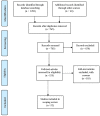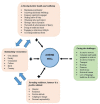Aging Well for Indigenous Peoples: A Scoping Review
- PMID: 35223727
- PMCID: PMC8866315
- DOI: 10.3389/fpubh.2022.780898
Aging Well for Indigenous Peoples: A Scoping Review
Abstract
As life expectancy increases for Indigenous populations, so does the number of older adults with complex, chronic health conditions and age-related geriatric syndromes. Many of these conditions are associated with modifiable lifestyle factors that, if addressed, may improve the health and wellbeing of Indigenous peoples as they age. If models of healthy aging are to be promoted within health services, a clearer understanding of what aging well means for Indigenous peoples is needed. Indigenous peoples hold a holistic worldview of health and aging that likely differs from Western models. The aims of this review were to: investigate the literature that exists and where the gaps are, on aging well for Indigenous peoples; assess the quality of the existing literature on Indigenous aging; identify the domains of aging well for Indigenous peoples; and identify the enablers and barriers to aging well for Indigenous peoples. A systematic search of online databases, book chapters, gray literature, and websites identified 32 eligible publications on Indigenous aging. Reflexive thematic analysis identified four major themes on aging well: (1) achieving holistic health and wellbeing; (2) maintaining connections; (3) revealing resilience, humor, and a positive attitude; and (4) facing the challenges. Findings revealed that aging well is a holistic concept enabled by spiritual, physical, and mental wellbeing and where reliance on connections to person, place, and culture is central. Participants who demonstrated aging well took personal responsibility, adapted to change, took a positive attitude to life, and showed resilience. Conversely, barriers to aging well arose from the social determinants of health such as lack of access to housing, transport, and adequate nutrition. Furthermore, the impacts of colonization such as loss of language and culture and ongoing grief and trauma all challenged the ability to age well. Knowing what aging well means for Indigenous communities can facilitate health services to provide culturally appropriate and effective care.
Keywords: Indigenous; Indigenous health; Indigenous older adults; Indigenous wellbeing; aging; scoping review.
Copyright © 2022 Quigley, Russell, Larkins, Taylor, Sagigi, Strivens and Redman-MacLaren.
Conflict of interest statement
The authors declare that the research was conducted in the absence of any commercial or financial relationships that could be construed as a potential conflict of interest.
Figures
References
-
- World Health Organization. Ageing and Health. (2018). Available online at: https://www.who.int/news-room/fact-sheets/detail/ageing-and-health (accessed September 20, 2021).
-
- World Health Organization . World Report on Ageing and Health. (2015).
-
- Reading J. The Crisis of Chronic Disease among Aboriginal Peoples: A Challenge for Public Health, Population Health and Social Policy. Victoria, BC: Centre for Aboriginal Health Research, University of Victoria; (2009).
Publication types
MeSH terms
LinkOut - more resources
Full Text Sources
Medical
Research Materials



